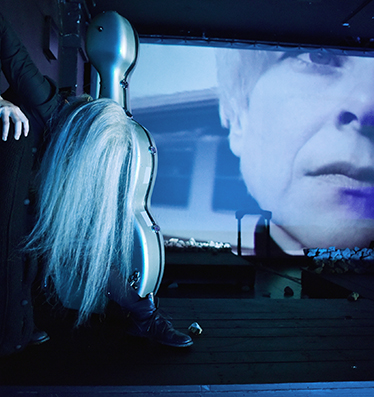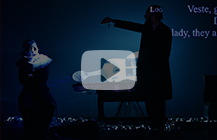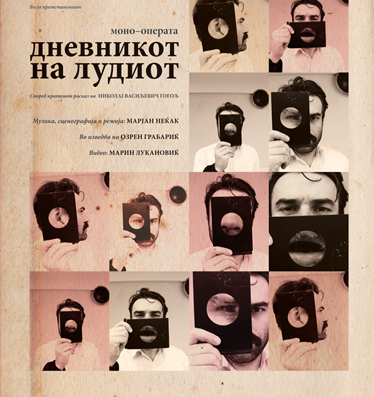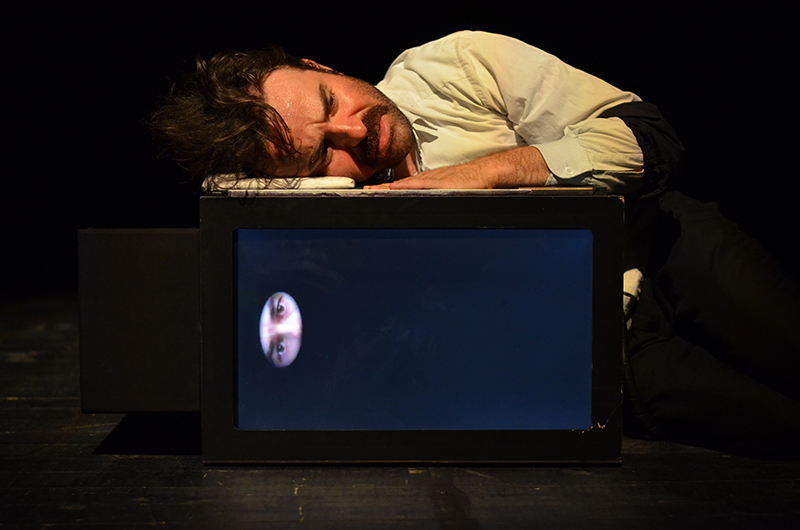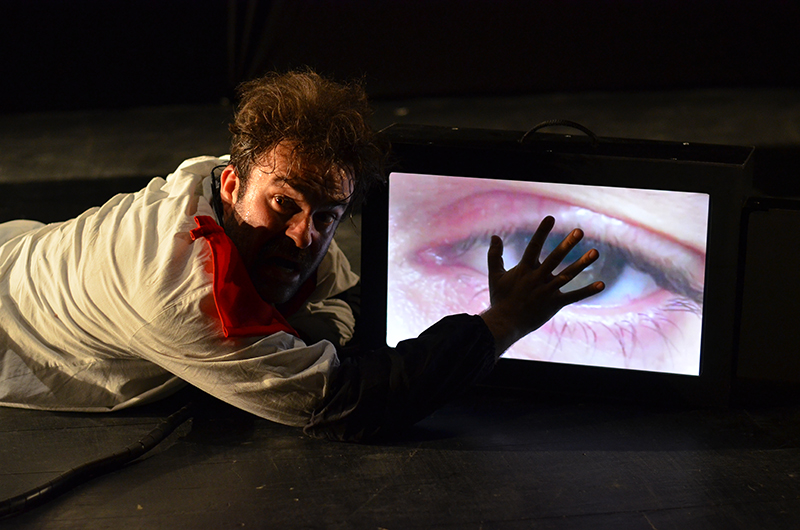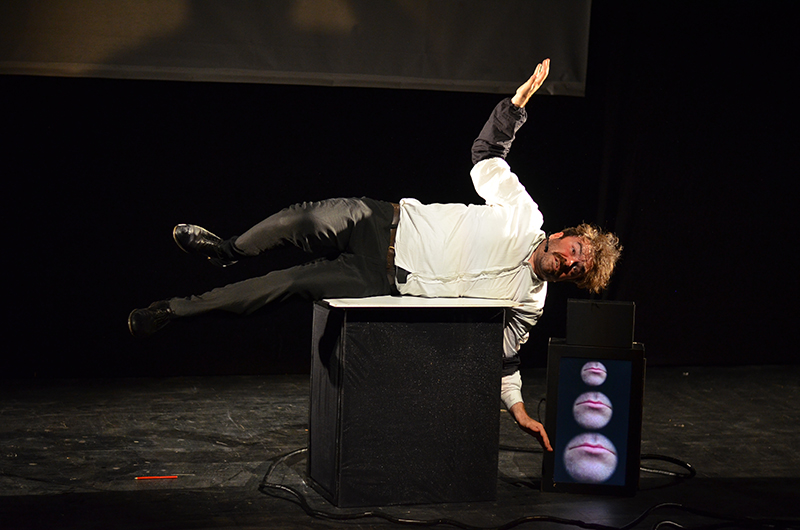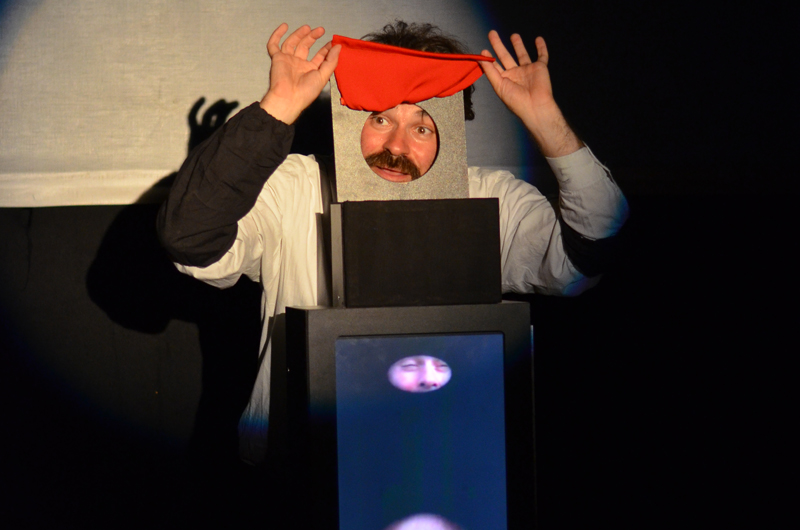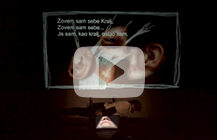“Diary of a Madman” by N. V. Gogol is considered to be one of the earliest detailed record of schizophrenia, long before the disease got its recognition and name in the medical practice. However, Gogol’s short story doesn’t analyse the disease in the medical sense, but rather questions the world in which the individual struggles to make sense of his identity and social status. Gogol, in a lucid manner - through the disease of Poprishchin, speaks about the disease of the society and reminds us that all of us are in some kind of conflict with the reality. Which reality is more real? The one we read about in the newspapers, the one we observe in our immediate vicinity, or the one inside us?
Festivals - performances
Ohrid Summer Festival, Macedonia, 2015 - 1
Youth Open Theater Festival, Skopje, Macedonia, 2015 - 1
Park - Ribnjak, Zagreb, Croatian scene of alternative theater, October, 2015 - 3
Park - Ribnjak, Zagreb, Croatian scene of alternative theater, December, 2015 - 3
Park - Ribnjak, Zagreb, Croatian scene of alternative theater, honoring the World Day of Theater, March, 27, 2016 - 2
Spring tour 2016
FEN Festival - Opatija, Croatia, 2016 - 1
Park - Ribnjak, Zagreb, Croatian scene of alternative theater, April, 2016 - 3
Small Scene Festival, Rijeka, Croatia, May, 2016 - 1
Monodrama Festival – Bitola, Macedonia, May, 2016 - 1
International festival of monodrama and mime, Zemun - 1
Summer tour 2016
Infant Festival - Novi Sad, Serbia, June, 2016 - 1
PUF Festival - Pula, Croatia, July, 2016 - 1
Split Summer Festival, Split, Croatia, July, 2016 - 1
Ulysses Festival, Brijuni, Croatia, August, 2016 - 2
Purgatorie Festival - Тivat, Monte Negro, August, 2016 - 1
June 2017
International festival of monodrama and mime, Zemun - 1
The play has been performed 32 times till September, 2017
Rewards for mono opera Diary of a Madman
Small Scene Festival, Rijeka, Croatia
- Best music
- Best actor
- Best performance - awarded by the Mediterranean Magazine, May, 2016
Monodrama Festival - Bitola, Macedonia
The audience award for best play, May, 2016
Infant Festival – Novi Sad, Serbia
Award for experimental and alternative theater – for the unique expressiveness of the line between the theater and other art. June, 2016.
PUF Festival - Pula, Croatia
Award for individual and complete realization, July, 2016
Purgatorie Festival, Tivat, Monte Negro
Grand prix for the best play on the Festival - Purgatorie, August, 2016
Grand prix for the best play
On its final performance, the play was presented on the Purgatorie Festival in Tivat, Monte Negro, where it received the ultimate grand prix of the Festival.
Golden Medal for Best Monodrama, 42nd International festival of monodrama and mime, Zemun 2017;
Golden Medal for Audience Award, 42nd International festival of monodrama and mime, Zemun 2017
The jury of the 11 Festival of Mediterranean Theater Purgatori, 2016 consised of: Mani Gotovac, theatrologist and president of jury, Tanja Boskovic - an actress, Zoran Zivkovic - a producer, after 10 watched plays in the official competition, pronounced the Dairy of a madman, produced by Moving Music Theatre, directed by Marjan Necak and performed by Ozren Grabaric, the best play.
The trio Gogolj, Necak, Grabaric is unusually precize and elloquent in a theatrical way. They search for an inspiration from each other. Its seems as if they are a jazz trio. Each of them contributes to the glow of the entire play. Their words, music, direction and acting show their briliance on much higher emotional and cognitive level.
Such work can only be realized when there is no „I“ within the course of work, when the rehearsal is done without measuring the time, peacefully, slowly, exhaustively, precisely - stands in the explanation of the jury.
Golden Medal for Best Monodrama, 42nd International festival of monodrama and mime, Zemun 2017. Golden Medal Audience Award, 42nd International festival of monodrama and mime, Zemun 2017. Best Monodrama, 5th Be:femon, Bečej 2017.
From the press:
Without a doubt we can state that the mono opera Diary of a Madman (…) is a real master-piece of acting, music and video art.
(Mira Muhoberac, Croatian Radio 3, Croatia)
Mono opera performed by Ozren Grabarić is currently the best show in Zagreb this autumn. The ease with which composer and director Marjan Nećak plays with Gogol’s ideas is incredible. (…) In the end, the doubt whether it is Poprishchin the one to lose his mind, or has the world lost its mind, remains unsolved, while the whole madness, in this superb performance, is projected straight into the head of each individual spectator (…) Departing from his usual approach in which he holds a certain cynical distance from his characters, in “Diary” Grabarić is fully immersed in Poprishchin’s madness, an approach which gives shockingly impressive results. The entire multidimensional psychedelic nightmare is further enhanced by the operatic form in which Grabarić swims with ease (…) Minimalistic set design consists of videoprojector, a table and an unusual box acting as a monitor and a loudspeaker. This box shows us parts of human face and represents Poprishchin’s subconscious and his superego, giving it all an aspect of a deranged installation in a museum of contemporary arts. If we add to it that the opera is performed in English and Spanish, with Croatian titles, one could say that Nećak-Grabarić-Lukanović triumvirate has produced a world-class show that can easily be performed on stages across the globe.
(Mia Mitrovic, 24express, Croatia)
To say that Grabarić’s performance and his vocal interpretation of extraordinary psychedelic music by Marjan Nećak is well-studied to the smallest detail would be an understatement. It is not just mysterious and deep, but it builds up very discreetly up to the culmination. (…) Nećak leads the madman as a perfect colourful character at the brink of madness, and a small step would suffice to cross the line and fall into the abyss from which there is no turning back. This is a rare theatrical plaidoyer, innovative, full-blooded and very suggestive. One of the surprises of this year’s MOT theatre festival in Skopje.
(Todor Kuzmanov, Radio Skopje, Macedonia)
“Mono-opera, an almost unknown genre in South-Eastern Europe, is a logical continuation of Nećak’s work. This hugely talented composer permanently surprises us with new work, this time venturing into directing a show tailor-made for an extra-ordinary actor. Ozren Grabarić - multi-talented dramatic artist from Zagreb - renown for his perfectionist approach towards building a character, perfectly answered the challenges of staging a musical theatre version of Gogol’s novel “Diary of a Madman”. And he is no stranger to the type of music theatre that Marjan Nećak produces. On the contrary, his singing capabilities, deeply embedded in his energy as an actor, seem to have always been aiming towards musical, which in this case is really an opera.”
(Svjetlana Hribar, Novi list, Croatia)
“It is an operatic performance that leaves no-one indifferent. It carries joy and satisfaction of a theatre that reaches to all the senses of spectator/listener who is drawn into this wellthought of, innovative interpretative satisfaction. This mono-opera is a completely new experience in the Balkans, clearly well-thought piece full of art, knowledge and with a precise goal. Gogol’s “Diary of a Madman” is impressively cut by maestro Marjan Nećak, with deeply expressive performance by Ozren Grabarić (talks and sings in English and Spanish) whose precise movement and symbolic use of scarce props tell Poprishchin’s story about all the ills and malfunctions of modern society.”
(Ljiljana Mazova, Globus, Macedonia)
“Croatian actor Ozren Grabarić fascinated the audience with his incredibly energetic performance.”
(vest.mk)
With a new matureness and Ozren Grabarić portraits the character of Gogol’s rebel, so disjointed from the world that he belongs only to his inner theatre, using various magnifying glasses to emphasise the fragmented mindset of the protagonist (…) It’s been a long time since we last saw a monodrama of such depth, originality and lucidity spiked with black humour such as Grabarić’s operatic “Madman”.
(Nataša Govedić, Novi list, Croatia)
Grabarić is a great master of scenic gradation and culmination, only to subdue his expression to lower, calmer spheres, and again, and again. In doing so he follows Nećak’s musical and spatial ideas perfectly, while videos by Lukanović coincide with both, thus forming a unique rhythm. (…) The way in which Ozren Grabarić presents it is simply impossible to describe with words. One needs to see and hear it, feel it and burst into tears over every discarded, hunted, humiliated and tortured human being, from the beginning of time until the end of the world.
(Darko Gašparovich, kazaliste.hr)
Marjan Nećak made a chamber multimedia spectacle ranging between music-hall, musical monodrama, drama and opera. Throughout the wondrous and multifarious show, versatile actor Ozren Grabarić is moving with great mastery, at times sounding like an entire orchestra or choir. The show is visually enriched with video by Marin Lukanović, whose ideas follow the chaos in the protagonist’s head.
(Kim Cuculić, Fenomentator, Croatia)
An extremely brave act of musical theatre… Total theatre in which literature is transformed into music… The saddest Poprishchin I have ever seen. Bravo!
(Refet Abazi, actor and professor at the University of Skopje)
“Each element of this drama-music-stage-video format emanates - excellence, key prerequisite for artistic creation. Accuracy, premeditation, precision all fit into the passion carried by remarkable Ozren Grabarić. The performance thrilled me with simplicity, dedication and belief that all-or-nothing is the only approach that gives meaning to the existence of artists in these superficial times.”
(Vitomira Lončar, producer, Croatia)
“You’ve managed to make an old cynic cry.”
(Aljoša Pužar, audience member, South Korea)








